No plea deal seen as Julian Assange faces what could be his final extradition hearing
By Rob Harris
February 20, 2024 —
London: The wife of jailed Wikileaks founder Julian Assange said her husband was unlikely to accept any plea deal with the United States government in return for early release over espionage and computer hacking charges, believing it would set a dangerous precedent for journalism.
Assange, 52, an Australian hacker-turned-publisher, faces what could be his final court hearing in London starting on Tuesday (UK time) as he tries to stop his extradition to the US on charges relating to the 2010 disclosure of a huge cache of classified government documents.

Stella Assange, wife of WikiLeaks founder Julian Assange, attends a news conference ahead of Julian Assange’s final UK appeal hearing, in London.
The UK High Court has scheduled two days of arguments over whether Assange, who spent seven years of self-exile inside a foreign embassy and the past five years in prison, can ask an appeals court to block his transfer. If the court doesn’t allow the appeal to go forward, he could be sent across the Atlantic.
In several media appearances ahead of the hearing, Stella Assange said her husband was “extremely weak” both physically and mentally and warned the decision could be a matter of life and death.
She said on Monday she was convinced if her husband was extradited to the US “he will die” and has revealed that the Australian High Commissioner to the UK, Stephen Smith, intervened over Christmas to secure medical attention at Belmarsh Prison.
Three years ago, a London court temporarily blocked his extradition to the US on the grounds that the move would put him at risk of suicide.

Asked if Assange was considering a plea deal with the US Department of Justice, which could involve authorities downgrading the charges in exchange for a guilty plea, Stella Assange said her husband was not prepared to admit guilt when none had taken place.
“The only thing that he would be pleading to is journalism,” she told ABC. “He is being accused of receiving information from a source, information that was in the public interest, that belonged in the public, and the US is actually engaged in an admission, an admission that they now criminalise journalism.
“Journalism has been re-classed as espionage; an unprecedented prosecution has been taken against a publisher for the very first time in the more than 100-year history of this act and it is going to set a precedent … that can then be used against the rest of press anywhere in the world,” Stella Assange said.
The US wants Assange to face trial on one charge of computer hacking and 17 charges of violating the 1917 Espionage Act, relating to one of the biggest leaks of classified material in history. If found guilty, Assange faces up to 175 years in jail, although authorities have said any sentence is likely to be much lower.

US ambassador Caroline Kennedy has flagged a potential plea deal between Julian Assange and the US government.
Prosecutors say he conspired with US army intelligence analyst Chelsea Manning to hack into a Pentagon computer and release secret diplomatic cables and military files on the wars in Iraq and Afghanistan. The trove included 90,000 reports relating to the war in Afghanistan, 400,000 relating to the Iraq war and 250,000 US diplomatic cables.
He later published thousands of emails belonging to Democratic presidential candidate Hillary Clinton’s campaign chairman, a development that dominated her 2016 election campaign.
Lawyers for Assange plan to argue he can’t get a fair trial in the US, that a US-UK treaty prohibits extradition for political offences and that the crime of espionage was not meant to apply to publishers.
His lawyers believe his foreign nationality and his political opinions would make it difficult for him to get a fair trail. Also, they believe Biden may see Assange as “closer to a high-tech terrorist than a whistleblower”.

Assange saga
How the seat of Australian power swung behind Assange
Assange and his supporters have also argued his leaking of classified military documents should be protected under the First Amendment because he was acting as a journalist when he published the documents. Those who’ve questioned the charges include the editorial boards of the New York Times and The Guardian, as well as Amnesty International.
He has been held at London’s Belmarsh jail since April 2019 when he was sentenced for skipping bail conditions. He had previously spent seven years in the Ecuadorian embassy after breaking bail in 2012 when he was due to be extradited to Sweden on unrelated sexual assault charges, which were subsequently dropped. He was arrested and forcibly removed from the Ecuadorean embassy by British police in 2019.
Stella Assange told BBC Radio 4’s Today program that “this could very well be the final hearing for Julian”.
“Julian cannot, will never be safe in a US prison, there is no question about it,” she said. “We know that there are elections coming up in the United States. He will simply never be safe if he is in US custody.”

Assange ‘endangered lives’: Top official urges Australia to understand US concerns
If the London court rejects Assange’s plea for a full appeal, he could be extradited to the US once British officials approve his removal. His legal team plans to appeal an adverse ruling to the European Court of Human Rights, but they fear he could possibly be transferred before the court in Strasbourg, France, could halt his removal.
Australia’s parliament last week passed a motion calling for the return of Assange to Australia, with Prime Minister Anthony Albanese, one of 86 MPs to vote in favour against 42 who opposed. He said he hoped the case could be “resolved amicably”.
US Secretary of State Antony Blinken last year pushed back against Australian government demands for an end to Assange’s prosecution, saying he was accused of “very serious criminal conduct”.

Rob Harris is Europe correspondent for The Sydney Morning Herald and The Age.Connect via email.
By Rob Harris
February 20, 2024 —
London: The wife of jailed Wikileaks founder Julian Assange said her husband was unlikely to accept any plea deal with the United States government in return for early release over espionage and computer hacking charges, believing it would set a dangerous precedent for journalism.
Assange, 52, an Australian hacker-turned-publisher, faces what could be his final court hearing in London starting on Tuesday (UK time) as he tries to stop his extradition to the US on charges relating to the 2010 disclosure of a huge cache of classified government documents.

Stella Assange, wife of WikiLeaks founder Julian Assange, attends a news conference ahead of Julian Assange’s final UK appeal hearing, in London.
The UK High Court has scheduled two days of arguments over whether Assange, who spent seven years of self-exile inside a foreign embassy and the past five years in prison, can ask an appeals court to block his transfer. If the court doesn’t allow the appeal to go forward, he could be sent across the Atlantic.
In several media appearances ahead of the hearing, Stella Assange said her husband was “extremely weak” both physically and mentally and warned the decision could be a matter of life and death.
She said on Monday she was convinced if her husband was extradited to the US “he will die” and has revealed that the Australian High Commissioner to the UK, Stephen Smith, intervened over Christmas to secure medical attention at Belmarsh Prison.
Three years ago, a London court temporarily blocked his extradition to the US on the grounds that the move would put him at risk of suicide.

Asked if Assange was considering a plea deal with the US Department of Justice, which could involve authorities downgrading the charges in exchange for a guilty plea, Stella Assange said her husband was not prepared to admit guilt when none had taken place.
“The only thing that he would be pleading to is journalism,” she told ABC. “He is being accused of receiving information from a source, information that was in the public interest, that belonged in the public, and the US is actually engaged in an admission, an admission that they now criminalise journalism.
“Journalism has been re-classed as espionage; an unprecedented prosecution has been taken against a publisher for the very first time in the more than 100-year history of this act and it is going to set a precedent … that can then be used against the rest of press anywhere in the world,” Stella Assange said.
The US wants Assange to face trial on one charge of computer hacking and 17 charges of violating the 1917 Espionage Act, relating to one of the biggest leaks of classified material in history. If found guilty, Assange faces up to 175 years in jail, although authorities have said any sentence is likely to be much lower.

US ambassador Caroline Kennedy has flagged a potential plea deal between Julian Assange and the US government.
Prosecutors say he conspired with US army intelligence analyst Chelsea Manning to hack into a Pentagon computer and release secret diplomatic cables and military files on the wars in Iraq and Afghanistan. The trove included 90,000 reports relating to the war in Afghanistan, 400,000 relating to the Iraq war and 250,000 US diplomatic cables.
He later published thousands of emails belonging to Democratic presidential candidate Hillary Clinton’s campaign chairman, a development that dominated her 2016 election campaign.
Lawyers for Assange plan to argue he can’t get a fair trial in the US, that a US-UK treaty prohibits extradition for political offences and that the crime of espionage was not meant to apply to publishers.
His lawyers believe his foreign nationality and his political opinions would make it difficult for him to get a fair trail. Also, they believe Biden may see Assange as “closer to a high-tech terrorist than a whistleblower”.

Assange saga
How the seat of Australian power swung behind Assange
Assange and his supporters have also argued his leaking of classified military documents should be protected under the First Amendment because he was acting as a journalist when he published the documents. Those who’ve questioned the charges include the editorial boards of the New York Times and The Guardian, as well as Amnesty International.
He has been held at London’s Belmarsh jail since April 2019 when he was sentenced for skipping bail conditions. He had previously spent seven years in the Ecuadorian embassy after breaking bail in 2012 when he was due to be extradited to Sweden on unrelated sexual assault charges, which were subsequently dropped. He was arrested and forcibly removed from the Ecuadorean embassy by British police in 2019.
Stella Assange told BBC Radio 4’s Today program that “this could very well be the final hearing for Julian”.
“Julian cannot, will never be safe in a US prison, there is no question about it,” she said. “We know that there are elections coming up in the United States. He will simply never be safe if he is in US custody.”

Assange ‘endangered lives’: Top official urges Australia to understand US concerns
If the London court rejects Assange’s plea for a full appeal, he could be extradited to the US once British officials approve his removal. His legal team plans to appeal an adverse ruling to the European Court of Human Rights, but they fear he could possibly be transferred before the court in Strasbourg, France, could halt his removal.
Australia’s parliament last week passed a motion calling for the return of Assange to Australia, with Prime Minister Anthony Albanese, one of 86 MPs to vote in favour against 42 who opposed. He said he hoped the case could be “resolved amicably”.
US Secretary of State Antony Blinken last year pushed back against Australian government demands for an end to Assange’s prosecution, saying he was accused of “very serious criminal conduct”.

Rob Harris is Europe correspondent for The Sydney Morning Herald and The Age.Connect via email.
BRIAN MELLEY
Updated Mon, February 19, 2024
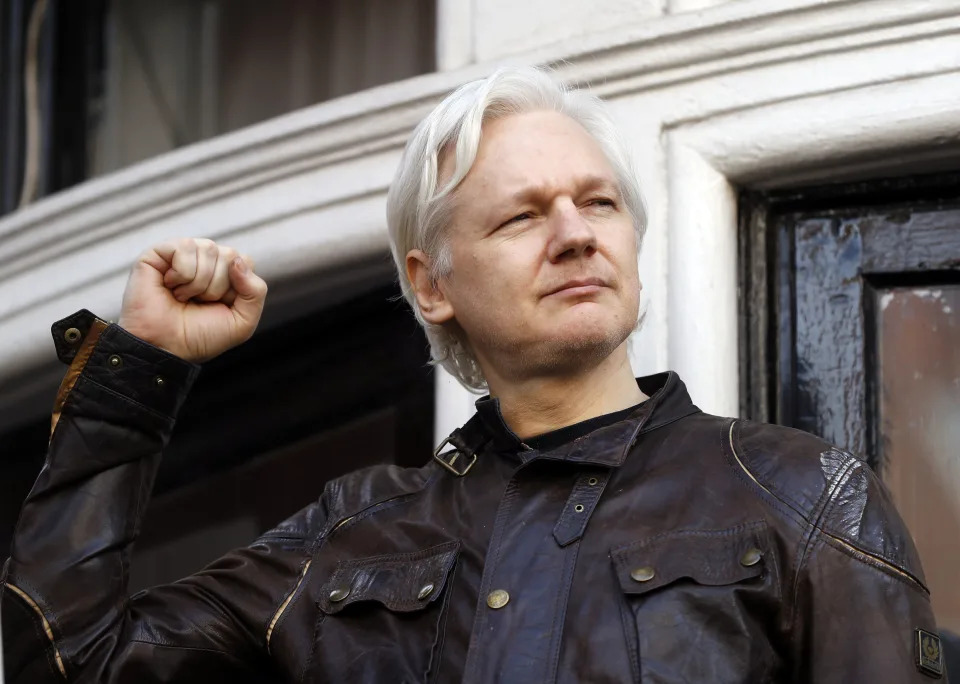
WikiLeaks founder Julian Assange pauses as he makes a statement to the media gathered outside the High Court in London, Dec. 5, 2011. WikiLeaks founder Julian Assange is facing what could be his final court hearing in England over whether he should be extradited to the United States to face spying charges. The High Court will hear two days of arguments next week over whether Assange can make his pitch to an appeals court to block his transfer to the U.S.
(AP Photo/Kirsty Wigglesworth, File)
LONDON (AP) — WikiLeaks founder Julian Assange's fight to avoid facing spying charges in the United States may be nearing an end following a protracted legal saga in the U.K. that included seven years of self-exile inside a foreign embassy and five years in prison.
Assange faces what could be his final court hearing in London starting Tuesday as he tries to stop his extradition to the U.S. The High Court has scheduled two days of arguments over whether Assange can ask an appeals court to block his transfer. If the court doesn't allow the appeal to go forward, he could be sent across the Atlantic.
His wife says the decision is a matter of life and death for Assange, whose health has deteriorated during his time in custody.
“His life is at risk every single day he stays in prison,” Stella Assange said Thursday. “If he’s extradited, he will die.”
WHAT IS ASSANGE CHARGED WITH?
Assange, 52, an Australian computer expert, has been indicted in the U.S. on 18 charges over Wikileaks' publication of hundreds of thousands of classified documents in 2010.
Prosecutors say he conspired with U.S. army intelligence analyst Chelsea Manning to hack into a Pentagon computer and release secret diplomatic cables and military files on the wars in Iraq and Afghanistan.
He faces 17 counts of espionage and one charge of computer misuse. If convicted, his lawyers say he could receive a prison term of up to 175 years, though American authorities have said any sentence is likely to be much lower.
Assange and his supporters argue he acted as a journalist to expose U.S. military wrongdoing and is protected under press freedoms guaranteed by the First Amendment to the U.S. Constitution.
Among the files published by WikiLeaks was video of a 2007 Apache helicopter attack by American forces in Baghdad that killed 11 people, including two Reuters journalists.
“Julian has been indicted for receiving, possessing and communicating information to the public of evidence of war crimes committed by the U.S. government,” Stella Assange said. “Reporting a crime is never a crime.”
U.S. lawyers say Assange is guilty of trying to hack the Pentagon computer and that WikiLeaks’ publications created a “grave and imminent risk” to U.S. intelligence sources in Afghanistan and Iraq.
WHY HAS THE CASE DRAGGED ON SO LONG?
While the U.S. criminal case against Assange was only unsealed in 2019, his freedom has been restricted for more than a dozen years.
Assange took refuge in the Ecuadorian Embassy in London in 2012 and was granted political asylum after courts in England ruled he should be extradited to Sweden as part of a rape investigation in the Scandinavian country.
He was arrested by British police after Ecuador’s government withdrew his asylum status in 2019 and then jailed for skipping bail when he first took shelter inside the embassy.
Although Sweden dropped its sex crimes investigation, Assange has remained in London’s high-security Belmarsh Prison while the extradition battle with the U.S. continues.
A judge in London initially blocked Assange’s transfer to the U.S. on the grounds he was likely to kill himself if held in harsh American prison conditions.
But subsequent courts cleared the way for the move after U.S. authorities provided assurances he wouldn’t experience the severe treatment that his lawyers said would put his physical and mental health at risk.
Stella Assange and her husband's supporters have criticized those assurances as being meaningless because they are conditional.
WHAT ARE POSSIBLE OUTCOMES FROM THE HEARING?
If the London court rejects Assange's plea for a full appeal, he could be extradited to the U.S. once British officials approve his removal.
His legal team plans to appeal an adverse ruling to the European Court of Human Rights, but they fear he could possibly be transferred before the court in Strasbourg, France, could halt his removal.
If he prevails at this week's hearing, it would set the stage for an appeal process that is likely to further drag out the case.
“This procedure has been marked by prolonged and creeping time frames,” Wikileaks Editor-in-Chief Kristinn Hrafnsson said. “We call it punishment through process. It is obviously a deliberate attempt to wear him down to punish him by taking this long.”
While the U.K. Supreme Court rejected Assange's petition, saying he didn't raise an “arguable point of law," his wife said his new bid will raise several points that are grounds for appeal.
Lawyers for Assange plan to argue he can't get a fair trial in the U.S., that a U.S.-U.K. treaty prohibits extradition for political offenses and that the crime of espionage was not meant to apply to publishers.
“The drafters of the Espionage Act did not intend for publishers to fall within its ambit,” Stella Assange wrote on X, formerly known as Twitter. “Unchallenged expert evidence showed that receipt and publication of state secrets is routine, and that there was an ‘unbroken practice of non-prosecution’ of publishers. The prosecution ‘crosses a new legal frontier’ and ‘breaks all legal precedents.’”
WHAT IS ASSANGE'S CURRENT STATE?
Stella Assange said her husband's mental and physical health has declined dramatically and he's aged prematurely in prison. He experienced a mini-stroke in October 2021 and was so ill in December that he broke a rib coughing.
“I worry about him every time he gets sick,” Stella Assange said. “The mental toll is extreme.”
The couple, who got married at Belmarsh Prison almost two years ago, have two young sons, Gabriel and Max, who were conceived during Assange's stay in the embassy.
The boys visit their father in prison every week, undergoing security checks that include being patted down by guards and sniffed by dogs, Stella Assange said. The couple is protective of the children, who haven’t been told why their father is behind bars, according to their mother.
“I don’t think it’s fair on them to know what’s really going on,” she said as she choked up. “They know exactly what a prison is. They know that the guards are stopping Julian from leaving the prison even though he wants to come home.”
LONDON (AP) — WikiLeaks founder Julian Assange's fight to avoid facing spying charges in the United States may be nearing an end following a protracted legal saga in the U.K. that included seven years of self-exile inside a foreign embassy and five years in prison.
Assange faces what could be his final court hearing in London starting Tuesday as he tries to stop his extradition to the U.S. The High Court has scheduled two days of arguments over whether Assange can ask an appeals court to block his transfer. If the court doesn't allow the appeal to go forward, he could be sent across the Atlantic.
His wife says the decision is a matter of life and death for Assange, whose health has deteriorated during his time in custody.
“His life is at risk every single day he stays in prison,” Stella Assange said Thursday. “If he’s extradited, he will die.”
WHAT IS ASSANGE CHARGED WITH?
Assange, 52, an Australian computer expert, has been indicted in the U.S. on 18 charges over Wikileaks' publication of hundreds of thousands of classified documents in 2010.
Prosecutors say he conspired with U.S. army intelligence analyst Chelsea Manning to hack into a Pentagon computer and release secret diplomatic cables and military files on the wars in Iraq and Afghanistan.
He faces 17 counts of espionage and one charge of computer misuse. If convicted, his lawyers say he could receive a prison term of up to 175 years, though American authorities have said any sentence is likely to be much lower.
Assange and his supporters argue he acted as a journalist to expose U.S. military wrongdoing and is protected under press freedoms guaranteed by the First Amendment to the U.S. Constitution.
Among the files published by WikiLeaks was video of a 2007 Apache helicopter attack by American forces in Baghdad that killed 11 people, including two Reuters journalists.
“Julian has been indicted for receiving, possessing and communicating information to the public of evidence of war crimes committed by the U.S. government,” Stella Assange said. “Reporting a crime is never a crime.”
U.S. lawyers say Assange is guilty of trying to hack the Pentagon computer and that WikiLeaks’ publications created a “grave and imminent risk” to U.S. intelligence sources in Afghanistan and Iraq.
WHY HAS THE CASE DRAGGED ON SO LONG?
While the U.S. criminal case against Assange was only unsealed in 2019, his freedom has been restricted for more than a dozen years.
Assange took refuge in the Ecuadorian Embassy in London in 2012 and was granted political asylum after courts in England ruled he should be extradited to Sweden as part of a rape investigation in the Scandinavian country.
He was arrested by British police after Ecuador’s government withdrew his asylum status in 2019 and then jailed for skipping bail when he first took shelter inside the embassy.
Although Sweden dropped its sex crimes investigation, Assange has remained in London’s high-security Belmarsh Prison while the extradition battle with the U.S. continues.
A judge in London initially blocked Assange’s transfer to the U.S. on the grounds he was likely to kill himself if held in harsh American prison conditions.
But subsequent courts cleared the way for the move after U.S. authorities provided assurances he wouldn’t experience the severe treatment that his lawyers said would put his physical and mental health at risk.
Stella Assange and her husband's supporters have criticized those assurances as being meaningless because they are conditional.
WHAT ARE POSSIBLE OUTCOMES FROM THE HEARING?
If the London court rejects Assange's plea for a full appeal, he could be extradited to the U.S. once British officials approve his removal.
His legal team plans to appeal an adverse ruling to the European Court of Human Rights, but they fear he could possibly be transferred before the court in Strasbourg, France, could halt his removal.
If he prevails at this week's hearing, it would set the stage for an appeal process that is likely to further drag out the case.
“This procedure has been marked by prolonged and creeping time frames,” Wikileaks Editor-in-Chief Kristinn Hrafnsson said. “We call it punishment through process. It is obviously a deliberate attempt to wear him down to punish him by taking this long.”
While the U.K. Supreme Court rejected Assange's petition, saying he didn't raise an “arguable point of law," his wife said his new bid will raise several points that are grounds for appeal.
Lawyers for Assange plan to argue he can't get a fair trial in the U.S., that a U.S.-U.K. treaty prohibits extradition for political offenses and that the crime of espionage was not meant to apply to publishers.
“The drafters of the Espionage Act did not intend for publishers to fall within its ambit,” Stella Assange wrote on X, formerly known as Twitter. “Unchallenged expert evidence showed that receipt and publication of state secrets is routine, and that there was an ‘unbroken practice of non-prosecution’ of publishers. The prosecution ‘crosses a new legal frontier’ and ‘breaks all legal precedents.’”
WHAT IS ASSANGE'S CURRENT STATE?
Stella Assange said her husband's mental and physical health has declined dramatically and he's aged prematurely in prison. He experienced a mini-stroke in October 2021 and was so ill in December that he broke a rib coughing.
“I worry about him every time he gets sick,” Stella Assange said. “The mental toll is extreme.”
The couple, who got married at Belmarsh Prison almost two years ago, have two young sons, Gabriel and Max, who were conceived during Assange's stay in the embassy.
The boys visit their father in prison every week, undergoing security checks that include being patted down by guards and sniffed by dogs, Stella Assange said. The couple is protective of the children, who haven’t been told why their father is behind bars, according to their mother.
“I don’t think it’s fair on them to know what’s really going on,” she said as she choked up. “They know exactly what a prison is. They know that the guards are stopping Julian from leaving the prison even though he wants to come home.”
Julian Assange: His wife says he would not survive US jail if extradited
By Paul Gribben
By Paul Gribben
BBC News

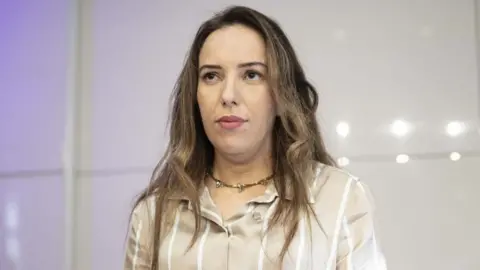

Reuters
Julian Assange's wife says the WikiLeaks founder would not survive being extradited from the UK to the US.
His final appeal will be heard at the High Court on Tuesday and Stella Assange says he is physically and mentally extremely weak.
She told BBC Radio 4's Today programme that "this could very well be the final hearing for Julian".
Mr Assange is wanted in the US on espionage charges and faces up to 175 years in prison.
The case is about him publishing thousands of classified documents in 2010 and 2011, which American authorities say broke the law and endangered lives.
He argues that the case against him is politically motivated.
Stella Assange told the BBC that if her husband loses Tuesday's High Court case in London, "there's no possibility for further appeal in this jurisdiction".
However, she did raise the possibility of applying to the European Court of Human Rights to try to secure an emergency injunction.
She suggested that based on similar extradition cases there would only be "a matter of 24 hours" in which to make such a legal move.
Julian Assange's wife says the WikiLeaks founder would not survive being extradited from the UK to the US.
His final appeal will be heard at the High Court on Tuesday and Stella Assange says he is physically and mentally extremely weak.
She told BBC Radio 4's Today programme that "this could very well be the final hearing for Julian".
Mr Assange is wanted in the US on espionage charges and faces up to 175 years in prison.
The case is about him publishing thousands of classified documents in 2010 and 2011, which American authorities say broke the law and endangered lives.
He argues that the case against him is politically motivated.
Stella Assange told the BBC that if her husband loses Tuesday's High Court case in London, "there's no possibility for further appeal in this jurisdiction".
However, she did raise the possibility of applying to the European Court of Human Rights to try to secure an emergency injunction.
She suggested that based on similar extradition cases there would only be "a matter of 24 hours" in which to make such a legal move.
She told the BBC that stress caused by the case had left her husband physically and mentally "in a very difficult place" knowing that "anything could happen this week.
"This case will determine if he lives or dies, essentially."
"This case will determine if he lives or dies, essentially."

Stella Assange said her husband's health had deteriorated during this "extremely stressful time"
Mr Assange, an Australian citizen, has been kept at London's Belmarsh Prison since 2019 as the US extradition case proceeded.
In 2021, the High Court ruled that Mr Assange should be extradited, and rejected claims that poor mental health meant he was at risk of taking his own life in a US jail.
The Supreme Court upheld that decision the following year and the then Home Secretary Priti Patel confirmed the extradition order.
Australia's parliament last week upheld a motion calling on the US and UK to release Mr Assange ahead of this week's key hearing.
Mr Assange, an Australian citizen, has been kept at London's Belmarsh Prison since 2019 as the US extradition case proceeded.
In 2021, the High Court ruled that Mr Assange should be extradited, and rejected claims that poor mental health meant he was at risk of taking his own life in a US jail.
The Supreme Court upheld that decision the following year and the then Home Secretary Priti Patel confirmed the extradition order.
Australia's parliament last week upheld a motion calling on the US and UK to release Mr Assange ahead of this week's key hearing.
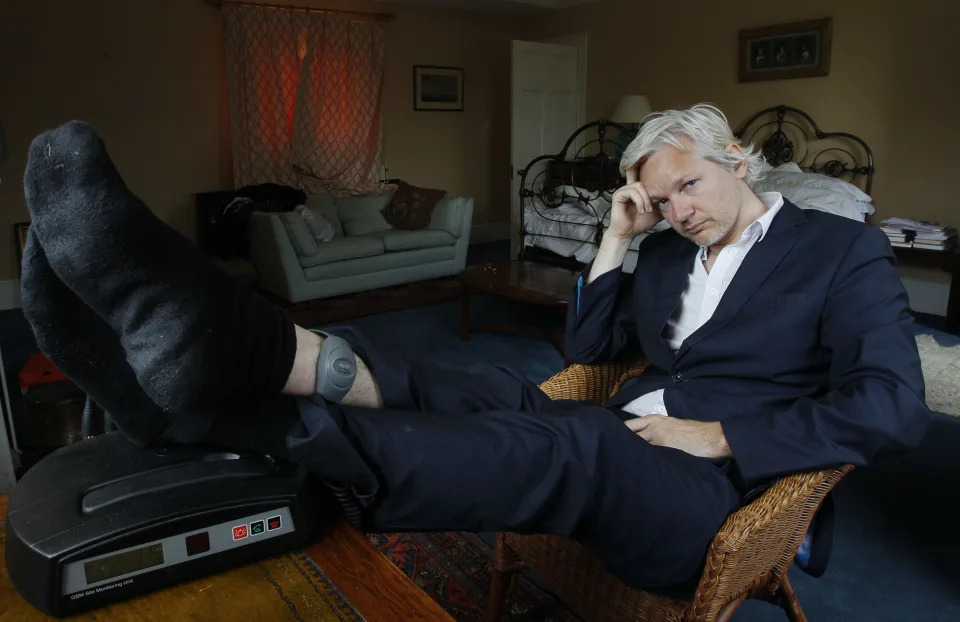
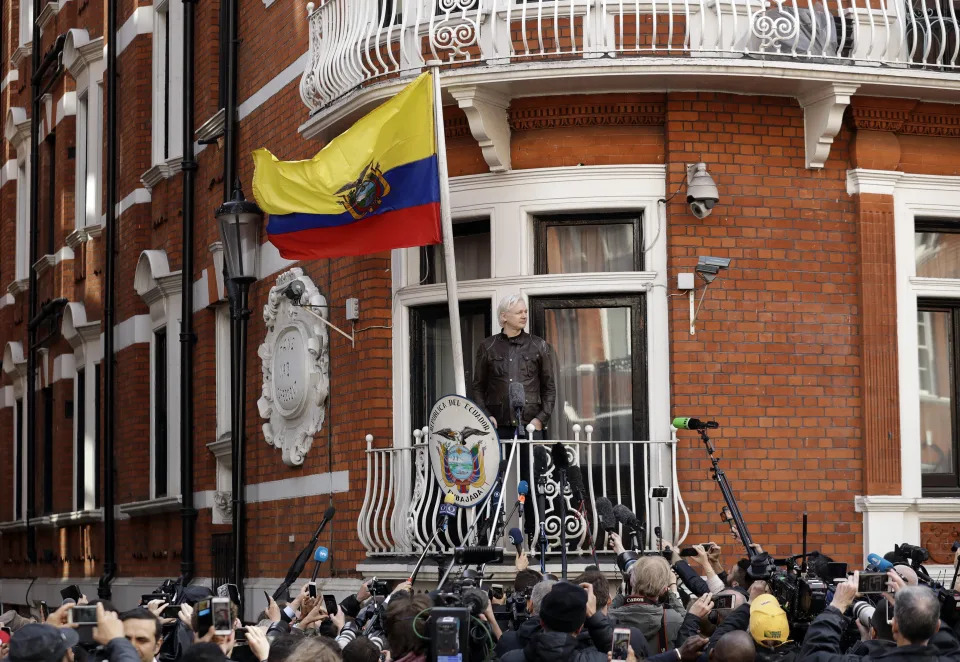

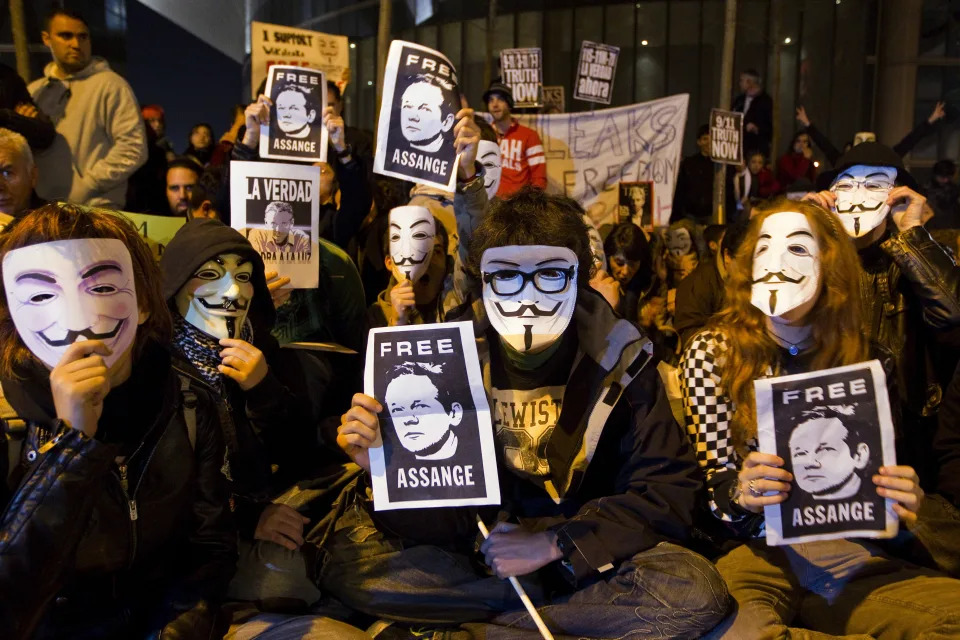
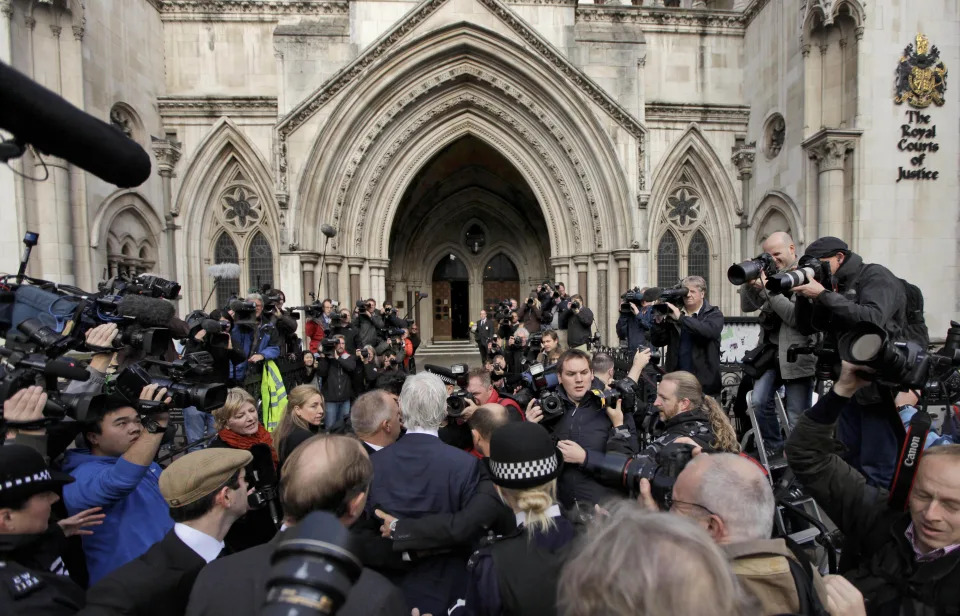


No comments:
Post a Comment